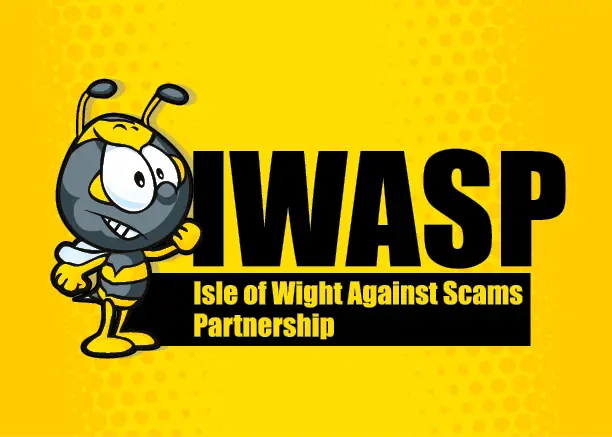The Isle of Wight council share this latest news. Ed
The Isle of Wight Council is highlighting the dangers of scams as part of a national awareness-raising campaign.
The Citizen’s Advice Bureau’s National Scams Awareness Fortnight runs from 10 – 23 June and runs for the next two weeks and aims to tackle the stigma scam victims often feel about reporting scams.
Stop, Report and Talk
The council, through the Isle of Wight Against Scams Partnership (IWASP) is urging local people who have been hit by a scam to STOP, REPORT, and TALK about it.
Outlaw: All scams are crimes
Cabinet member for community safety and public protection, Cllr Tig Outlaw, said:
“Of course we want residents to be scam aware throughout the year but this fortnight aims to flag it up. Scams come in many different forms – postal, telephone, online – all of which are designed to make victims part with their money and personal details by intimidating them or promising cash, prizes, services and fictitious high returns on investment. It is important to remember that no matter what type of scam, all scams are crimes.
“We work hard with our media partners to flag up any new reported scams to training our partners – including the fire service, police, Age UK, Southern Housing, Action on Hearing Loss and the Citizens Advice team – to be scam aware so you can be confident that if you do have concerns, our partners are able to support you.”
Reporting a Scam
For advice on scams call – Citizens Advice Consumer Helpline: 03454040506
To report a scam call – Action Fraud: 0300 123 2040
If you are concerned about somebody you care about or for more information on scams visit www.iwasp.org.uk
IWASP, of which the council is a lead partner, is also supporting the National Trading Standards Scams Team with its campaign to attract 1 million ‘Friends Against Scams’ by 2020.
Raising awareness about scams and the harm they can do is a priority of the partnership so the council is asking Island residents to go to the Website and sign up.
Tips on avoiding getting stung by a scam
Below are some tips to avoid you falling victim to scams.
- Be alert to the fact that scams exist. When dealing with uninvited contacts from people or businesses, whether it’s over the phone, by mail, email, in person or on a social networking site, always consider the possibility that the approach may be a scam. Remember, if it looks too good to be true, it probably is.
- Know who you’re dealing with. If you’ve only ever met someone online or are unsure of the legitimacy of a business, take some time to do a bit more research. Do a Google image search on photos or search the internet for others who may have had dealings with them. If a message or email comes from a friend and it seems unusual or out of character for them, contact your friend directly to check that it was really them that sent it.
- Do not open suspicious texts, pop-up windows or click on links or attachments in emails – delete them: If unsure, verify the identity of the contact through an independent source such as a phone book or online search. Don’t use the contact details provided in the message sent to you.
- Choose your passwords carefully. Choose passwords that would be difficult for others to guess and update them regularly. A strong password should include a mix of upper and lower case letters, numbers and symbols. Don’t use the same password for every account/profile, and don’t share your passwords with anyone.
- Beware of any requests for your details or money. Never send money or give credit card details, online account details or copies of personal documents to anyone you don’t know or trust. Don’t agree to transfer money or goods for someone else: money laundering is a criminal offence.
- Be wary of unusual payment requests. Scammers will often ask you to use an unusual payment method, including preloaded debit cards, gift cards, iTunes cards or virtual currency such as Bitcoin.
- Remember anyone can fall victim to scams.
If you are a member of a group and would like a talk from a member of IWASP about protecting yourself and those you care about from scams then please contact Trading Standards on trading.standards@iow.gov.uk or ring (01983) 823370





